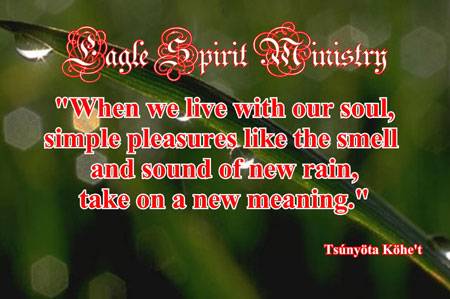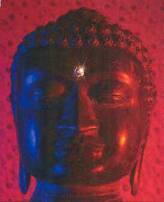 |
 |
||
| Adaptation of | ||
 |
||
|
|
||
|
One of the first principles of magick that I was taught dealt with the illusion of reality. As mortal humans, we begin our lives very open and accepting of the world around us. We view the world and all we survey with wonder. But before long, we fall victim to something called 'Consensus Reality'. Consensus Reality is really a nice way of saying that those whom we loved and trusted began teaching us their perception of the world and how it worked, and because we loved and trusted them, we willingly accepted their prevailing view of just how all things are as the truth. Their consensus reality then became the predominant lens through which we watched, analysed, and interpreted all of the experiences and events in our lives. As we grew older, we reinforced this consensus reality by adding our own experiences to it. There is absolutely nothing wrong with any of that, as long as we remember that our perception of reality is really only an illusion of true reality, and is based upon what nationality we are, what part of the country we live in, what our religious and political beliefs are, and what kind of a home life we had as a child, to mention a few. This is the only reality that we will ever know. It may grow, change, and expand, but it is still based on the foundation of Consensus Reality. That means for the most part that in the illusion of our reality we experience pretty much exactly what we expect to experience, because we will always filter, analyse and interpret our experiences the same way. This is the principle by which, for example, a woman prone to abusive men always seems to find one. Barring some monumental event which changes our consensus reality, we are, for the most part, at its mercy - we are it and it is us. |
||
 |
||
|
Now, we will go one step further. Since it is impossible to act contrary to our illusion of reality, we continually feed and reinforce the external reality which we experience by repeatedly creating it. Ever listen to your internal chatter? I mean really listen to what you constantly tell yourself? You might be quite surprised at what you hear yourself saying. But that's not the end of it. You have just created a thought, an emanation of you. Mix that with the power of some emotion, and presto - you have magick. Thoughts are things, and all things start with just a thought. The more repetitive the thought, the more powerful it becomes. Thoughts become beliefs, beliefs become patterns, patterns become a way of life. Mix those thought patterns with the force of emotion to propel them towards manifestation, and you have the exact formula for casting a spell. There is an old occult adage that says 'whatever you fear the most or desire the most, you draw it to you'. That is magick so simple that men and women with no occult background perform it every day. With this in mind, let's look at the how we maintain the reality of illusion through consensus reality. Our illusion of reality contains all of the filters, lenses, and memory patterns necessary to enable us to perceive, understand and cope with the experiences in our lives. Our illusion of reality is the very anchor that locks us into this linear time and space. Without our illusions of reality we would be totally helpless, vulnerable and disconnected to the world outside. Mental institutions around the world are full of individuals who have lost their link to consensus reality, although they still maintain an individual illusion of reality. What do we do when we experience things which exist outside our illusion of reality? For most people, this is a very easy process. They simply plaster over the crack in their illusion very quickly by rationalizing it away or going into denial. If it does not fit our illusion of reality, then it can not possibly exist. Therefore, we obviously did not really see or experience it. This is classic consensus reality, but should some catastrophic event damage or alter our illusion of reality and violate our consensus reality, our illusion of reality must shift to accommodate the change. People who practice magick have an illusion of reality which includes possibilities which 'normal' reality does not. Since the Magickal reality does not work within the same bounds and restrictions as 'normal' reality, the possibilities are only bounded by the limits of the magickal illusion of reality. |
||
 |
||
|
The training of Shamans, sorcerers, and healers in many cultures begins with the deliberate destruction of the prospective apprentice's illusion of reality. Another frequent way by which an individual may become open to the magickal illusion is through a catastrophic event or illness which destroys or significantly alters the normal illusion of the individual. For those readers desiring to open your illusion of reality to include or expand your magickal experiences, the process is not that difficult. Almost every day, sometime in our waking experience, we inadvertently stumble across cracks in our illusions of reality. A crack is anything that we may see or experience that does not fit into our illusion of reality. Some are very subtle, some are quite glaring. For example, a glaring crack could be someone who adamantly does not believe in ghosts, but is experiencing poltergeist activities. Another simpler example is a woman who believes herself to be unlovable, but suddenly finds a man who really loves her. Do you think she is going to readily accept him or try to rationalize his motives? Your illusion is your reality. It seems a natural response when something happens that is out of the ordinary to exclaim, 'I can't believe it.' The next time you find yourself face to face with something that you do not believe exists or a circumstance that your illusion says could not happen, or you hear yourself saying you can't believe something, explore it, allow it to exist and make the most of it. As you allow these cracks to exist and you discover the thrill of playing in them, you will find that more and more cracks will appear, until at last, your illusion of reality becomes pliable and can include infinite possibilities. |
||
 |
||
|
Since your illusion of reality will not let you acknowledge or experience anything that you do not believe exists, you must continually expand your illusion one small piece at a time. This is the single most important aspect of magick. The willingness to allow the possibility that something truly extraordinary might exist and that you are capable of experiencing or manifesting it. Within the text of Shamanism And Universal Magick, I discuss extensively the Five Principles of Magick, but the Five Principles of Manifestation will be of little value if your illusion of reality does not contain the possibility of you being able to manifest your desire in your world. The following exercise is called 'not-doing' and is designed to do two things. One, it is a way to deliberately force yourself into a crack in the illusion of your reality. Two, it will show you just how difficult it is to break routine patterns and force yourself to do something out of character. One way of deliberately playing in the crack is to completely reverse your morning routine, including deliberately shaving (if you're a guy) and brushing your teeth from the opposite direction than usual or with the opposite hand. Or try deliberately going to and from work by other routes that you never travel (within reason). Another way is to sit quietly and observe the landscape for a while. This is something we do regularly. Now, look only at the shadows, making them the reality. This is something we do not normally do, so it is called a 'not-doing'. |
||
 |
||
|
Do you feel a kind of dizzy disconnectedness, like when you ride in an elevator? Here's another exercise with the landscape. It is a proven fact that as we look around us, our mind takes pictures of what we focus on; a tree, a bush, a car, a stump, prominent features. After you have looked around a while, focus on the areas of the landscape that are not prominent; places you don't normally see. These are good places to hide by the way, because people simply do not look there. Here is another. Using the four elements; earth, air, fire, water notice places where two of the elements come together, such as between the wick and the flame on a candle, or where the earth and water come together in a bowl of water with a rock in it (the rock sticks out above the water). Slip in between the elements. This is a not-doing. |
||
 |
||
|
Another is to notice the place where fog and the landscape come together, or the point at which night becomes day (dawn), and day becomes night (dusk). This is why they are considered magickal times and places. Not-doing is also why we use rhyme in our rituals and spells; we don't talk in rhyme in our normal, everyday conversations. Remember pig-Latin, and how magickal it sounded? It was a not-doing that fascinated us as kids. |
||
|
Rev. Ronald S. Eppich, PhD |
||
 |
||
 |
||

